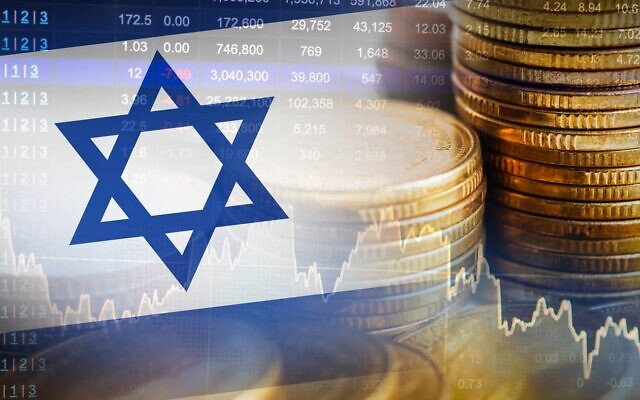Israel’s economy down but signs are positive, say experts after Moody’s downgrade
The credit rating agency recently lowered Israel to A2 citing the impact of the ongoing war with Hamas on its finances
The Israeli economy is navigating its way through a state of flux. Last week, credit rating agency Moody’s downgraded Israel’s rating from A1 to A2, resulting in a depreciation of the shekel and apprehension over market volatility.
But there remains reason to be optimistic about the economy’s long-term standing, and strength of the shekel, say some of the nation’s leading financial experts.
Following the downgrade, Shmuel Abramzon, chief economist at the Israel Ministry of Finance, told Jewish News: “Naturally we are in a fairly exceptional economic situation due to the war. As expected, we saw some negative impacts at the start of war but since then, we are seeing a large set of positive indicators.

“Israel has recorded years of steady growth, with periods of exceptional growth, and recorded years of gradual lowering of its debt to GDP ratios, which are very favourable compared to other countries. Israel also has a very strong labour market with low levels of unemployment and we have managed to conquer inflation, so there are lots of positives.”
The decision by Moody’s – the first rating downgrade in Israel’s history – was a blow to the country already grappling with a tech downturn and foreign and local investment dips.
The agency cited the impact of the ongoing military conflict with Hamas on its finances, and added a negative outlook to the new rating over concerns that the war could spill over to other fronts such as with Hezbollah in northern Israel. It also expressed concern over a “period of elevated domestic political upheaval and renewed polarisation when the war cabinet dissolves.”
But Moody’s noted that the economy itself “has managed the fall-out from the conflict reasonably well” with some indicators pointing to a swift rebound, reflected in the rapid recovery from the initial shock of 7 October, and the labour force is approaching pre-war levels.
“While there is much uncertainty, especially over the potential escalation of the war, there are a bunch of very clear indicators pointing to the strength of the fundamentals of the Israel economy” said Abramzon, pointing out that even after Moody’s downgrade to A2, this is still a relatively high credit rating – similar to Ireland’s. “So it is important to put it into context.”
The A2 rating is still considered a relatively low risk and was already widely anticipated and priced in by the market.

Modi Shafrir, chief strategist, financial markets at Bank Hapoalim, told Jewish News: “Since the outbreak of the war, the markets began pricing Israel as a country with a BBB rating (BBB+ as of last Friday 9 February), so this downgrade was already incorporated and implied into the markets. However, there is concern now that the markets will react more negatively to this downgrade and also to the reactions of senior government officials, who have attacked Moody’s decision as politically motivated, which was unprofessional, although we can see that the markets are relatively calm.”
Finance Minister Bezalel Smotrich criticised Moody’s decision. He said in a statement that the announcement “reflects a lack of confidence in Israel’s security and national strength, and also a lack of confidence in the righteousness of Israel’s path against its enemies.”
He added that the decision “does not include serious economic arguments and is nothing but than a political manifest based on pessimistic and absurd geopolitical worldview…”
Prime Minister Benjamin Netanyahu said Israel’s economy was strong and “the downgrade is entirely due to the fact that we are at war.” He declared that once the war ended, the rating would go up once again.

Photo Credit: Bank of Israel
Responding to Moody’s rating decision, the Governor of the Bank of Israel, Professor Amir Yaron pointed out that Israel “has experienced geopolitical crises in the past, when the debt to GDP ratios were much higher [according to Moody’s assessments, the public debt to GDP ratio should peak at 67 per cent and then decline gradually], and there was never any delay in repayment of government debt. In this context, it is important to remember the economy’s high potential growth and the structural surplus in the current account.”
Shafrir said “the high surplus in Israel’s Current Account surplus and the net positive foreign investment into Israel” were key markers that the Israeli economy and shekel are well-placed for the longer-term.
“In the short term, the trend will be determined according to political developments and the war,” said Shafrir. “Reaching a cease-fire agreement and release of hostages will lead to an appreciation [of the shekel], but on the other hand, an escalation in the north and a significant war against Hezbollah would greatly weaken the shekel.
“Looking a year ahead, assuming geopolitics and politics stop weighing heavily, the basic forces support a strong currency and will lead to its strengthening in the future.”
Lawmakers recently gave initial approval to a revised 2024 state budget that added tens of billions of shekels to finance the war and compensate those affected, as well as a rise in the budget deficit this year to 6.6 per cent of GDP from 2.25 per cent. But Professor Asher Blass, owner of Economic Research and Consulting Group (ERCG) and former chief economist at the Bank of Israel, believes more could be done.
He said: “This budget deficit was too high. It should have been set at five per cent. The government has not taken all the necessary steps.”

Professor Blass said that while there hasn’t been a collapse of the shekel since the war began, the credit rating is “definitely something to worry about long-term as it could change the flow of foreign investment and raise the interest premium.
“There are a lot of unknowns at the moment that remain to be determined. The construction industry is a major part of the economy that now has a huge absence of workers and it remains to be seen if these workers come back. The industry was already facing a slowdown and if these workers don’t come back then this will have a dramatic effect on its recovery.
“The economic situation will depend on whether proper economic decisions are taken along with if there is a war in Lebanon and the political stability of Israel.
“The economy is in a state of flux right now.”
If the war remains contained, and ends soon, a sharp rebound is forecast for 2025. The economy grew 6.5 per cent in 2022 and projections for last year are at around two per cent, partly due to the negative impact from the war. Predictions for 2024 are between 0.5 and 2 per cent and between five and 5.5 per cent for 2025.
Abramzon believes there is much to be optimistic about. “Immediately after the war, the economic news was less positive but since then, we have seen the Shekel strengthening and today it is trading stronger than it was on the eve of the war, as well as the TASE, which is trading higher than pre-war. There has also been a rebound of credit card purchases to levels higher than before 7 October and while many workers have been called up to the reserves, we see a very clear path of the labour market going back to pre-war trends. The signs are positive. As we have seen with previous wars, we have this bounce back and the Israeli economy has the resilience to go back to where it was.” He added: “Ensuring security is a fundamental factor for economic activity and we hope that will happen soon.”
Economic eyes for the foreseeable will be firmly fixed on the outcome of the war and ongoing government decisions.
In order to strengthen the trust of the markets and of the ratings agencies in the Israeli economy, Professor Yaron said it is “important that the government and the Knesset act to deal with the economic issues raised in the report.
“The Bank of Israel has already presented a number of ways to act in this spirit, including approval of the 2024 budget by the Knesset, with all the adjustments included in it.
“The Israeli economy is rooted on strong and healthy economic fundamentals, and is a world leader in the fields of innovation and technology. We have known how to recover from difficult periods in the past and rapidly return to prosperity, and the Israeli economy has the strength to ensure that this will happen this time as well.”

Thank you for helping to make Jewish News the leading source of news and opinion for the UK Jewish community. Today we're asking for your invaluable help to continue putting our community first in everything we do.
For as little as £5 a month you can help sustain the vital work we do in celebrating and standing up for Jewish life in Britain.
Jewish News holds our community together and keeps us connected. Like a synagogue, it’s where people turn to feel part of something bigger. It also proudly shows the rest of Britain the vibrancy and rich culture of modern Jewish life.
You can make a quick and easy one-off or monthly contribution of £5, £10, £20 or any other sum you’re comfortable with.
100% of your donation will help us continue celebrating our community, in all its dynamic diversity...
Engaging
Being a community platform means so much more than producing a newspaper and website. One of our proudest roles is media partnering with our invaluable charities to amplify the outstanding work they do to help us all.
Celebrating
There’s no shortage of oys in the world but Jewish News takes every opportunity to celebrate the joys too, through projects like Night of Heroes, 40 Under 40 and other compelling countdowns that make the community kvell with pride.
Pioneering
In the first collaboration between media outlets from different faiths, Jewish News worked with British Muslim TV and Church Times to produce a list of young activists leading the way on interfaith understanding.
Campaigning
Royal Mail issued a stamp honouring Holocaust hero Sir Nicholas Winton after a Jewish News campaign attracted more than 100,000 backers. Jewish Newsalso produces special editions of the paper highlighting pressing issues including mental health and Holocaust remembrance.
Easy access
In an age when news is readily accessible, Jewish News provides high-quality content free online and offline, removing any financial barriers to connecting people.
Voice of our community to wider society
The Jewish News team regularly appears on TV, radio and on the pages of the national press to comment on stories about the Jewish community. Easy access to the paper on the streets of London also means Jewish News provides an invaluable window into the community for the country at large.
We hope you agree all this is worth preserving.






















